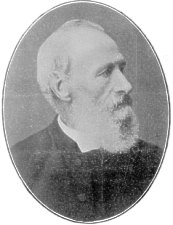
Brief biography in M.W. Harrison's South Ramsey and its Churches.
See all W. Cubbom The Kermode Family of Ramsey IoMNH&ASoc vol V #1 p109-121
[taken from Chapter 1 Manx Worthies, A.W.Moore, 1901]
a son of Thomas Kermode and Margaret Cowle, was born in Ramsey. He was educated at King William's College and Dublin University, being ordained deacon in 1839 by James Bowstead, Bishop of Sodor and Man, and priest in 1840 by Henry Pepys, his successor. After holding two curacies, he was, in 1843, appointed Chaplain of St. Paul's, Ramsey, where he remained for 28 years. During this time he attended with the utmost zeal, not only to the ministrations of the Church, but to the relief of the poor, and the alleviation of the sufferings of the sick. In 1840, he was mainly instrumental, in connexion with High Bailiff Tellet, in forming the Ramsey "Health Association" for the preservation of the public health-an association which was practically the beginning of the self government of the town. In 1849, he was foremost in suggesting sanitary precautions against cholera, and, in 1853, when cholera visited Ramsey for the second time, he tended the sick, and laid the dead in their coffins with his own hands. In acknowledgment of his devoted services, both at this time and in the education of the children of the town, he received a presentation of silver from the inhabitants of Ramsey. In 1856, the Ramsey Sanitary and Medical was instituted by him. He built the present St. Paul's Parsonage on a portion of the Claughbane estate presented by his father, contributing one third of the cost out of his own pocket, and he restored and reopened Ballure Chapel. His devotion to duty was in all respects so unremitting that it affected his health, which rendered it necessary in 1871 that he should be removed to the comparatively easy work of the parish of Maughold. Here he effected many improvements in the schools and vicarage, and had a large share in obtaining an increase to the vicar's stipend by the success of a suit which he brought against the Crown, entirely at his own risk, for the recovery of the royalties of the iron mine running under the glebe lands. He held the office of surrogate from 1847 onwards, while the confidence reposed in him by his brother clergy was shown by the feet that they elected him as their proctor to York Convocation in 1872, and reselected him to the same office in 1874, 1880, 1885, and 1886. When Bishop Hill revived the office of rural dean, in 1879, he appointed WILLIAM KERMODE first Rural Dean of Peel. In 1877, he left Maughold on his appointment to the Rectory of Ballaugh, in which parish also he did much for the schools. He built the new and commodious rectory there, besides restoring and reopening, the old church. He was a zealous antiquarian, being a President, and a very valuable member, of the " Isle of Man Natural History and Antiquarian Society." He initiated a " Parish Book " for Ballaugh, in which he wrote a useful account of the antiquarian remains in the parish, and a record of events of special interest to its people.* The Archdeacon (HughesGames), when preaching at Ballaugh on the Sunday evening after his funeral, said: " He was a man of much weight and dignity of character unostentatious and unobtrusive, always calm and thoughtful; always to be depended upon, always the same, wise, sagacious, and practical. His influence amongst his brother clergy was deservedly great, his counsel was always valued by them. He will be greatly missed by us; the Manx Church has lost in him not only one of its most valued and useful servants, but also one of its wisest and most experienced counsellors."
Bishop Bardsley, who preached in the morning, also spoke of him in eulogistic terms, referring more especially to his eloquence as a preacher.
* This is a practice which should be more generally followed.
|
|
Brief biography in M.W. Harrison's South Ramsey and its Churches. See all W. Cubbom The Kermode Family of Ramsey IoMNH&ASoc vol V #1 p109-121 |
|
|
||
|
|
||
|
Any comments, errors or omissions
gratefully received The
Editor |
||